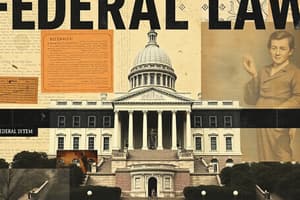Podcast
Questions and Answers
In civil cases involving accidental injuries, what is the primary goal?
In civil cases involving accidental injuries, what is the primary goal?
- To establish new civil laws regarding accidents.
- To determine if a crime was committed.
- To punish the person who caused the accident.
- To ensure the injured party is compensated for their loss. (correct)
Which of the following scenarios falls under the umbrella of civil law, even if it doesn't involve a dispute?
Which of the following scenarios falls under the umbrella of civil law, even if it doesn't involve a dispute?
- Reporting someone for tax fraud
- Drafting a will (correct)
- A dispute between neighbors regarding property lines
- A case of armed robbery
Why do the military and people under 18 have separate legal systems?
Why do the military and people under 18 have separate legal systems?
- They are not considered full citizens under the law.
- Their cases are too complex for regular courts.
- To ensure their unique circumstances are handled appropriately. (correct)
- They are exempt from certain regular laws.
What is the name of the system of criminal laws that applies to individuals in the military?
What is the name of the system of criminal laws that applies to individuals in the military?
What is a military trial called?
What is a military trial called?
What does the Manual for Courts-Martial primarily explain?
What does the Manual for Courts-Martial primarily explain?
How does the military justice system differ from the civilian system?
How does the military justice system differ from the civilian system?
Which of the following actions could be considered a violation of the UCMJ but NOT a violation of civilian law?
Which of the following actions could be considered a violation of the UCMJ but NOT a violation of civilian law?
Which of the following scenarios would be exclusively handled under criminal law?
Which of the following scenarios would be exclusively handled under criminal law?
A person is accused of a crime. Which party is always on one side of the case in a criminal trial?
A person is accused of a crime. Which party is always on one side of the case in a criminal trial?
What is the key distinction between felonies and misdemeanors?
What is the key distinction between felonies and misdemeanors?
In a civil case, what is the primary goal of the legal process?
In a civil case, what is the primary goal of the legal process?
Which area of law would govern a dispute over the terms of a sales contract?
Which area of law would govern a dispute over the terms of a sales contract?
If a defendant is found not guilty in a criminal trial, what is the legal term for the outcome?
If a defendant is found not guilty in a criminal trial, what is the legal term for the outcome?
Which of the following actions is MOST likely to be classified as a misdemeanor?
Which of the following actions is MOST likely to be classified as a misdemeanor?
How does the volume of civil laws compare to that of criminal laws?
How does the volume of civil laws compare to that of criminal laws?
Flashcards
Criminal Laws
Criminal Laws
Laws that define actions as crimes.
Felony
Felony
A serious crime usually punishable by more than a year in jail.
Misdemeanor
Misdemeanor
A less serious crime, usually punishable by less than a year in jail or a fine.
Defendant (Criminal)
Defendant (Criminal)
Signup and view all the flashcards
Acquitted
Acquitted
Signup and view all the flashcards
Civil Laws
Civil Laws
Signup and view all the flashcards
Purpose of Civil Law
Purpose of Civil Law
Signup and view all the flashcards
Defendant (Civil)
Defendant (Civil)
Signup and view all the flashcards
Judge or Jury Role
Judge or Jury Role
Signup and view all the flashcards
Civil Injury Case
Civil Injury Case
Signup and view all the flashcards
Civil Law (Agreements)
Civil Law (Agreements)
Signup and view all the flashcards
Special Legal Systems
Special Legal Systems
Signup and view all the flashcards
Military Law
Military Law
Signup and view all the flashcards
Uniform Code of Military Justice (UCMJ)
Uniform Code of Military Justice (UCMJ)
Signup and view all the flashcards
Court-Martial
Court-Martial
Signup and view all the flashcards
Manual for Courts-Martial
Manual for Courts-Martial
Signup and view all the flashcards
Study Notes
- Laws are divided into two main categories: criminal and civil
- Courts treat criminal and civil cases differently
Criminal Law
- Criminal laws define actions as crimes
- Criminal laws are found at the federal, state, and local levels of government
- These laws appear in statutes, regulations, and state constitutions
- Felonies are serious crimes punishable by over a year in jail
- Misdemeanors are less serious, penalized usually with less than a year in jail, or a fine
- Laws specify whether violations are felonies or misdemeanors, further classified by severity
- A criminal trial asks, "Did this person commit a crime?"
- The government charges the accused
- The defendant is either acquitted or found guilty, facing fines or jail time
Civil Law
- Civil law addresses non-criminal issues such as property, divorce, contracts, wills, injury, bankruptcy, employment, agriculture and taxes
- Civil laws help settle disagreements, such as property rights, child custody, and contract disputes
- Both sides present their case, and a judge or jury decides the facts and remedy
- Civil cases also cover injury not caused by crime where agreement on compensation must be reached
- Civil law also covers making a will or drawing up a contract
Special Systems of Law
- Two law systems operate differently: military and juvenile
- Unique populations and circumstances necessitate specialized systems
- U.S. Constitution grants Congress power to regulate land and naval forces via the Uniform Code of Military Justice (UCMJ)
- The UCMJ lists criminal laws, trial procedures, and punishments applicable to military personnel
- The military justice system is separate from the civilian system because UCMJ contains laws specific to the military
- UCMJ addresses military-specific offenses (leaving without permission, disrespecting superiors, disobeying orders)
- All military members are subject to the military justice system
Juvenile Law
- Criminal laws generally apply to everyone, but most states have a juvenile justice system for offenders under 18
- The juvenile justice system is more flexible than the adult system
- Judges consider various factors in a child's life
- The juvenile system gives young people chances to learn from mistakes
- Laws like curfew and school attendance are targeted at people under 18
- Laws protect children from abuse
- Most states outline procedures when an abused child is removed from their home
- Adoption, foster care, and special health and education programs are included
- Delinquent: A minor found guilty of a crime
- Status Offender: A minor who breaks a law that would not apply to adults (e.g., skipping school)
- Child Protective Services: A government agency that responds to child abuse or neglect reports
Studying That Suits You
Use AI to generate personalized quizzes and flashcards to suit your learning preferences.




